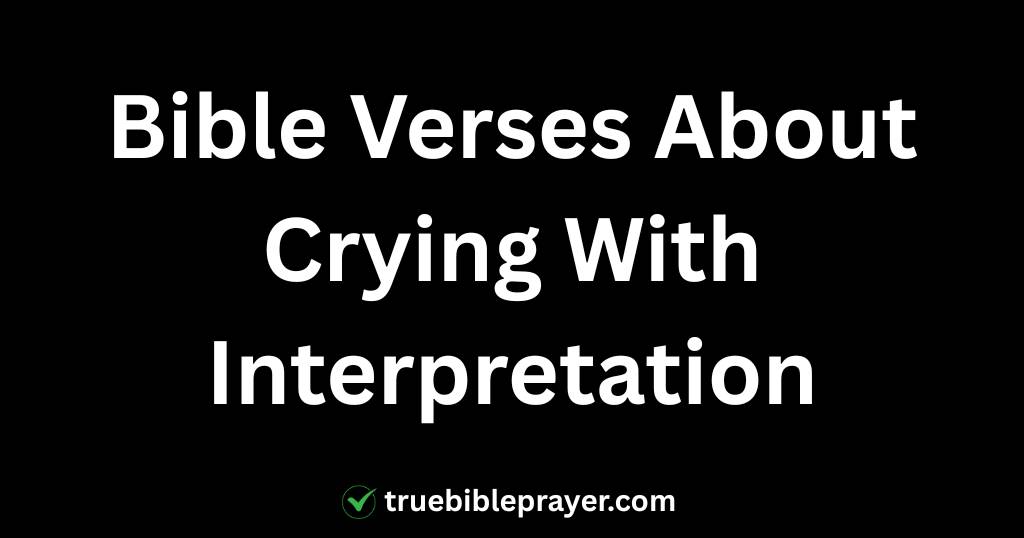Crying is a natural response to emotions like sadness, frustration, or even joy. It is our body’s way of releasing intense feelings that words cannot always express. When we cry, it can feel like a release a moment where our heart speaks through tears. While crying is often linked to pain, it also reflects our vulnerability and humanity. It shows that we are not immune to life’s struggles, yet it can also be a step toward healing.
This article offers deep insights into how Scripture speaks to our pain and tears, providing comfort and guidance. You will find powerful verses and interpretations that show how God listens to our cries and promises healing.
what does the bible say about crying?
The Bible speaks openly about crying, showing that it is a part of the human experience. God understands our tears and does not view them as a sign of weakness. In Psalm 56:8, it says, “You keep track of all my sorrows. You have collected all my tears in your bottle.” This verse reminds us that God sees our pain and values our tears.
In moments of sorrow, the Bible assures us that God is close. Psalm 34:18 says, “The Lord is close to the brokenhearted and saves those who are crushed in spirit.” This provides comfort, knowing that in our darkest moments, God is near, offering peace and healing.
Finally, the Bible promises that one day, there will be no more tears. Revelation 21:4 shares, “He will wipe every tear from their eyes.” It’s a reminder that crying is temporary, and God’s ultimate plan brings hope for a future without sorrow.
Get More: Bible Verses About Toxic Family With Interpretation
God Sees Our Tears
Psalm 56:8
“You keep track of all my sorrows. You have collected all my tears in your bottle. You have recorded each one in your book.” Description:
This verse highlights God’s intimate knowledge of our sorrow. Every tear we shed is seen and recorded by Him.
Interpretation:
God deeply cares for our pain and does not ignore our tears. It shows His closeness and love, assuring us that He is aware of every burden we carry, even when others cannot see our suffering.
Psalm 34:18
“The Lord is close to the brokenhearted and saves those who are crushed in spirit.” Description:
Here, the Bible reassures us that God is near to those experiencing deep emotional pain.
Interpretation:
When we feel devastated and broken, God is not distant. His presence brings comfort and healing, reminding us that we are never truly alone, even in our most painful moments.
Revelation 21:4
“He will wipe every tear from their eyes. There will be no more death or mourning or crying or pain, for the old order of things has passed away.” Description:
This verse promises a future where sorrow and crying are no more.
Interpretation:
While crying is part of the human experience now, this verse offers hope that one day, God will put an end to all pain and suffering. It reassures us that our tears are temporary, and God’s ultimate plan will bring everlasting peace.
Psalm 147:3
“He heals the brokenhearted and binds up their wounds.” Description:
This verse speaks of God’s healing power for those in emotional pain.
Interpretation:
God does not just notice our sorrow; He actively works to heal it. Through His love and care, He mends our hearts, providing the comfort we need to recover from grief.
Isaiah 25:8
“He will swallow up death forever. The Sovereign Lord will wipe away the tears from all faces; He will remove His people’s disgrace from all the earth. The Lord has spoken.” Description:
This verse envisions a time when death and grief are forever erased.
Interpretation:
God promises ultimate restoration and healing. The image of wiping away tears suggests a tender and compassionate God who desires to remove the pain and shame of His people for good.
2 Kings 20:5
“I have heard your prayer and seen your tears; I will heal you.” Description:
God acknowledges both the prayers and the tears of His people, offering healing.
Interpretation:
God listens not only to our words but also to the pain we express through tears. This verse encourages us to be vulnerable with God, knowing He responds with love and healing.
Jeremiah 31:16
“This is what the Lord says: ‘Restrain your voice from weeping and your eyes from tears, for your work will be rewarded,’ declares the Lord. ‘They will return from the land of the enemy.’” Description:
This verse speaks of a future reward for those who cry in sorrow.
Interpretation:
While we may experience tears in this life, God promises a time of restoration. Our tears are not in vain, and they will be followed by God’s blessings and deliverance.
Matthew 5:4
“Blessed are those who mourn, for they will be comforted.” Description:
Jesus offers comfort to those who grieve, promising that mourning leads to blessing.
Interpretation:
Mourning is not something to avoid; it is part of the journey toward comfort and healing. God blesses those who face their grief with the assurance that He will bring them peace.
John 11:35
“Jesus wept.” Description:
This is the shortest verse in the Bible, yet it profoundly demonstrates Jesus’ empathy.
Interpretation:
Jesus’ tears at the death of Lazarus show that He understands human sorrow. He is not distant from our pain but deeply moved by it, sharing in our grief.
Psalm 30:5
“Weeping may stay for the night, but rejoicing comes in the morning.” Description:
This verse contrasts temporary sorrow with lasting joy.
Interpretation:
While sorrow is real, it is not permanent. God promises that after the night of weeping, joy and renewal will come, reminding us that our tears are part of a larger journey toward healing.
Crying as a Form of Prayer
Romans 8:26
“In the same way, the Spirit helps us in our weakness. We do not know what we ought to pray for, but the Spirit Himself intercedes for us through wordless groans.” Description:
This verse shows that even when we cannot express our pain in words, the Spirit intercedes on our behalf.
Interpretation:
Crying can be a form of deep prayer. When words fail, the Holy Spirit understands and communicates our feelings to God, showing that our tears are not without purpose.
Psalm 42:3
“My tears have been my food day and night, while people say to me all day long, ‘Where is your God?’” Description:
The psalmist describes the overwhelming pain of sorrow that even tears become a constant companion.
Interpretation:
This verse reflects the anguish of feeling abandoned. Yet, it invites us to bring all our emotions—sorrow, questions, doubts—before God, trusting that He hears and understands.
2 Corinthians 7:10
“Godly sorrow brings repentance that leads to salvation and leaves no regret, but worldly sorrow brings death.” Description:
This verse draws a distinction between sorrow that leads to growth and sorrow that holds us captive.
Interpretation:
Crying can bring us closer to God, especially when it leads to repentance and a deeper understanding of His love. God values our genuine sorrow, which transforms us and draws us into a deeper relationship with Him.
Luke 7:38
“As she stood behind Him at His feet weeping, she began to wet His feet with her tears. Then she wiped them with her hair, kissed them, and poured perfume on them.” Description:
A woman expresses deep repentance and love through her tears before Jesus.
Interpretation:
This powerful act of crying before Jesus reflects the connection between tears and devotion. Our tears can be an offering to God, showing humility, repentance, and a desire for His forgiveness.
Lamentations 2:18
“The hearts of the people cry out to the Lord. Wall of Daughter Zion, let your tears flow like a river day and night; give yourself no relief, your eyes no rest.” Description:
This verse portrays the sorrow of a people crying out to God in their distress.
Interpretation:
Crying in times of distress is a natural response that God welcomes. It’s a form of reaching out to Him for help, and through these tears, we align ourselves with His compassionate heart.
Psalm 72:12
“For he will deliver the needy who cry out, the afflicted who have no one to help.” Description:
This verse promises deliverance for those in desperate situations, crying out to God for help.
Interpretation:
Crying is not a sign of weakness but an invitation to receive God’s intervention. God listens to those in need and acts on their behalf, delivering them from despair.
Psalm 80:5
“You have fed them with the bread of tears; you have made them drink tears by the bowlful.” Description:
This verse depicts the sorrow of the people, overwhelmed by their tears.
Interpretation:
Even in overwhelming pain, God is present. Though it may feel like we are drowning in our sorrow, this verse reassures us that God sees us in our deepest pain and will provide sustenance and healing.
Nehemiah 1:4
“When I heard these things, I sat down and wept. For some days I mourned and fasted and prayed before the God of heaven.” Description:
Nehemiah’s tears were a response to the suffering of his people, and he turned them into prayer.
Interpretation:
Crying is not just an emotional response but can be an act of seeking God’s will. Nehemiah’s mourning led to action, demonstrating that our tears can lead us into deeper prayer and intercession for others.
Exodus 2:23
“During that long period, the king of Egypt died, and the Israelites groaned in their slavery and cried out, and their cry for help because of their slavery went up to God.” Description:
This verse reflects the desperate cry of the Israelites for deliverance.
Interpretation:
When we face oppression or hardship, God hears our cries for help. Our suffering is not ignored; it stirs God’s response, just as the Israelites’ cries led to their deliverance from Egypt.
God’s Compassion and Comfort
Matthew 11:28
“Come to me, all you who are weary and burdened, and I will give you rest.” Description:
Jesus offers rest and comfort to those who are emotionally and physically weary.
Interpretation:
Crying often stems from weariness and emotional strain. Jesus invites us to lay our burdens down before Him, finding comfort and rest in His presence.
Isaiah 40:11
“He tends his flock like a shepherd: He gathers the lambs in his arms and carries them close to his heart; he gently leads those that have young.” Description:
This verse portrays God’s tender care for His people, offering gentle guidance and comfort.
Interpretation:
God’s compassion is tender and personal. When we cry, He gathers us close, offering both comfort and strength to carry on. His embrace is one of unconditional love and care.
2 Corinthians 1:3-4
“Praise be to the God and Father of our Lord Jesus Christ, the Father of compassion and the God of all comfort, who comforts us in all our troubles, so that we can comfort those in any trouble with the comfort we ourselves receive from God.” Description:
This verse emphasizes God’s role as the source of all comfort.
Interpretation:
When we cry, God comforts us, but He also calls us to extend that comfort to others. Our experiences of grief and crying become channels through which we share God’s love with others.
Isaiah 53:3
“He was despised and rejected by mankind, a man of suffering, and familiar with pain. Like one from whom people hide their faces he was despised, and we held him in low esteem.” Description:
This verse describes the suffering of Jesus, who understood pain and rejection.
Interpretation:
Jesus’ own suffering and tears make Him fully empathetic to our pain. He is not distant from our struggles but intimately acquainted with sorrow, offering us a deep understanding and comfort.
Psalm 126:5
“Those who sow with tears will reap with songs of joy.” Description:
This verse speaks of a time when sorrow will turn to joy.
Interpretation:
Though we may sow in tears, the promise is that joy will come. Our mourning is not the end, but it leads to a harvest of happiness and fulfillment through God’s provision and timing.
2 Samuel 22:7
“In my distress I called to the Lord; I called out to my God. From His temple He heard my voice; my cry came to His ears.” Description:
This verse highlights how God listens when we cry out in distress.
Interpretation:
No cry goes unheard by God. In our darkest moments, He hears us and responds, bringing comfort and deliverance in ways we might not expect.
Matthew 9:36
“When He saw the crowds, He had compassion on them, because they were harassed and helpless, like sheep without a shepherd.” Description:
Jesus’ compassion for the lost is clear in this verse, showing His deep care for those in distress.
Interpretation:
When we cry, whether in personal sorrow or for the suffering of others, God is moved with compassion. Jesus cares deeply about our pain and offers us His guidance and comfort.
Luke 19:41
“As He approached Jerusalem and saw the city, He wept over it.” Description:
Jesus wept over Jerusalem, mourning its rejection of peace.
Interpretation:
Jesus’ tears reflect His deep love for those who are lost. His crying shows His heart for those who suffer, offering a model for us to express compassion for others.
Zechariah 10:6
“I will strengthen Judah and save the tribes of Joseph. I will restore them because I have compassion on them. They will be as though I had not rejected them, for I am the Lord their God and I will answer them.” Description:
God promises to restore and comfort those who are in distress.
Interpretation:
God’s compassion leads to restoration. He hears our cries and responds by bringing comfort, healing, and deliverance, assuring us that we are never beyond His reach or love.
In this article, we explored how God sees and understands our tears, offering comfort and compassion in times of sorrow. We learned that crying is not a sign of weakness but a powerful way to express our pain to God, who listens, cares, and promises to heal our hearts. From the Psalms to the teachings of Jesus, the Bible assures us that our tears are not unnoticed, and they lead to comfort, restoration, and ultimately joy.
If you are experiencing grief or hardship, remember that God sees you, hears you, and is always near, ready to provide peace and healing. Trust that your sorrow is not in vain, and His love will guide you through.




